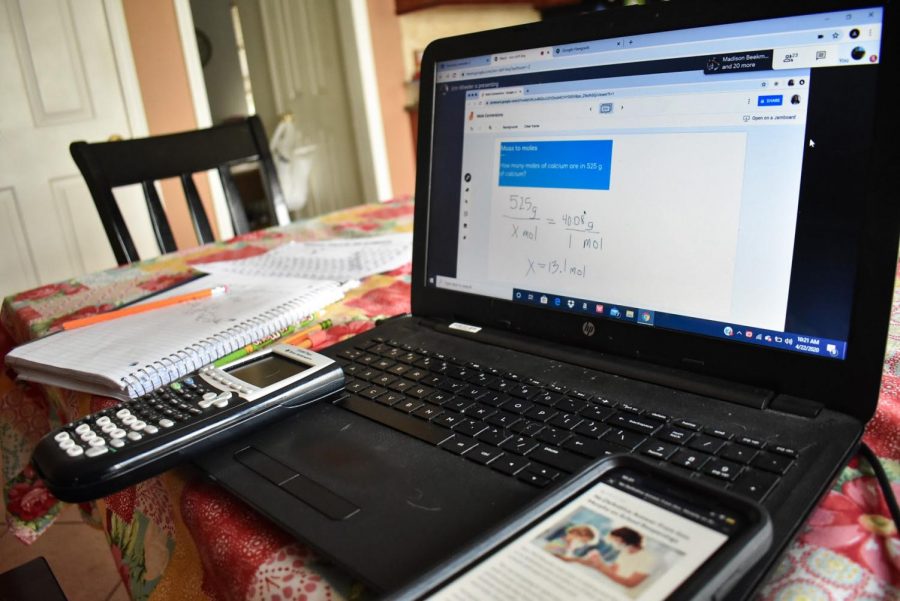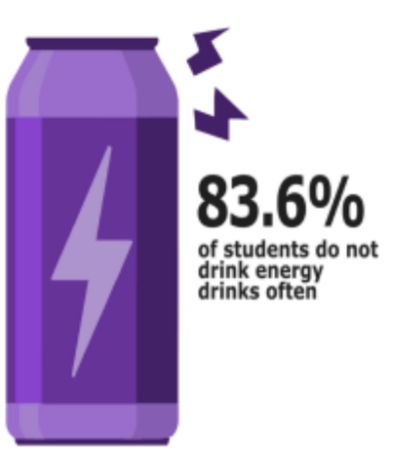Disadvantages of online learning outweigh its benefits
Erin Wheeler’s Chemistry class completes virtual worksheets after adapting to remote learning. All Communications High School courses transitioned online on Monday, March 16, and will continue indefinitely.
May 8, 2020
During a digital age in which anything is possible, many students are enrolling in online classes and studying from home. Some do it in order to advance their careers while furthering their education, whereas others only learn online temporarily to obtain their degree while avoiding a global health crisis. All types of learning environments come with their fair share of advantages and disadvantages, subjective to teachers and students alike, making online learning less beneficial.
There are a variety of advantages to online learning, ranging from convenience to cost. There’s no longer any commute time for faculty members or students, with an absence of any travel costs. There is also a lessened constraint for one’s learning pace as students manage a more personalized schedule. Many class attendees can also continue to work, making it easier for students to accumulate money and multitask. Overall, online courses are better suited for many introverts, visual learners and those who may require more time or different approaches to understand the material provided. Online education as a whole allows teachers and students to find more innovative and creative approaches to instruction, challenging what it means to be educated. This can be highly effective for those who are of an age to be self-disciplined with a strong skills relating to organization and time management.
But while varieties of online educational methods have been developed, such alternatives cannot necessarily compensate for students’ and teachers’ complex needs both in and out of the classroom. It’s important to recognize that while online learning works for some, it most definitely does not work for all. Consulting firm Eduventures found that only 33% of prospective online students agree that the quality of online education is ‘as good as or better than’ face-to-face education. Such a learning environment can be difficult for students who are more dependent and cannot recognize or communicate their needs effectively. Even in the case that a student is an independent learner they may not have the financial stability to purchase devices that allow them to. Additionally, if all American students are required to be online at the same time, it’s likely to cause technological issues with Internet connection and access to applications, enabling students to use troubleshooting skills or pay the extra cost of high-speed Internet, both of which they may not be able to manage.
Beyond students’ efforts and access, many teachers’ and parents’ methods of instruction are compromised. Teachers are now unable to measure the effectiveness of assessments, as it’s questionable if students are truly absorbing information, or just making it seem that way through the completion of seemingly meaningless assignments. It also seems nearly impossible for working parents to carry out the same quality of supervision and learning as a trained professional who is paid to dedicate time and attention to children, especially for those who are of a younger age or have special needs. Outside of professional relations, students’ personal relations will also likely be compromised. Communication skills and emotional maturity are much harder to gain from behind a computer screen, despite being crucial to adolescents’ growth and happiness. It will be difficult and nearly impossible to develop relationships with classmates, network within the academic environment, build upon teamwork skills and avoid being socially stunted altogether.
As a student, one should closely examine the online program that interests them, ensuring that the level of rigor matches their needs. More than ever, schools are dependent on the individual’s motivation to learn and better their future. As part of an academic community, one must adjust to the unique schedule and learning opportunities, examine the benefits and risks,and analyze their preferences and concerns as closely as possible in order to salvage any sense of education that we as a nation have left.















Shammy Peterson • May 10, 2022 at 5:51 pm
The thing that stuck out to me the most is when you pointed out that there will be an absence of travel costs when you consider online dedication. My sister will surely consider this tip because her family has moved outside the city since last month. She needs to enroll her son in high school next month, and I will share this with her. https://www.scac.nsw.edu.au/high-school-enrolment